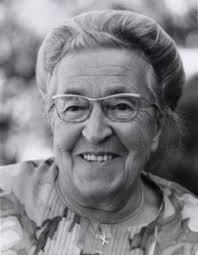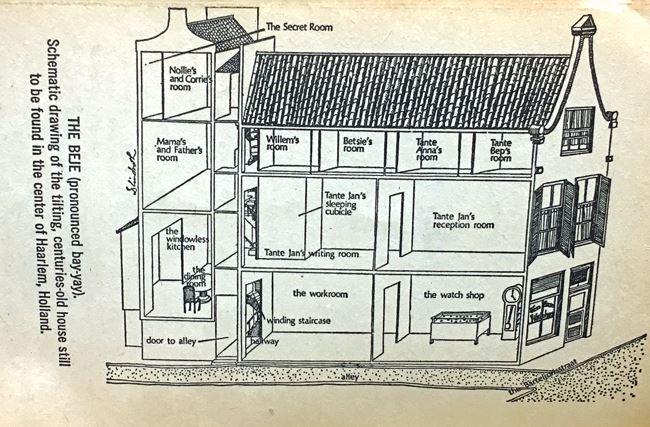 Corrie ten Boom lived during the Nazi regime and witnessed the persecutions around her. Instead of being a bystander, she took initiative and saved many Jewish lives.https://www.findagrave.com/memorial/22002/corrie-ten_boom“The measure of a life, after all, is not its duration, but its donation” (ten Boom). Corrie ten Boom explains that our life should not be measured in years, but instead by the amount that we give to others. Heroes often sacrifice their lives by giving to others every day, measuring their lives by the number of people they help. A hero is being courageous but humble, intelligent yet selfless. A hero is an individual who helps others in need and stands up for what is right no matter what others think. Heroism is found as a fireman runs into a burning building, a boy who picks up trash at a beach, a girl talking to a new student, or a woman giving to a homeless man on the streets. Heroes’ actions reflect our ideal moral values and what we want to see in ourselves. They are someone we look up to, and they stand for the right thing despite popular beliefs. Heroes are not afraid to act, especially in a crowd when everyone else hesitates to act. They are not concerned about the consequences of doing the right thing. Additionally, the other characteristics of heroes are kindness and loyalty. Kindness is the ability to empathize and help others without asking for anything in return. Loyalty is sticking to personal moral beliefs despite any circumstances put in.
Corrie ten Boom lived during the Nazi regime and witnessed the persecutions around her. Instead of being a bystander, she took initiative and saved many Jewish lives.https://www.findagrave.com/memorial/22002/corrie-ten_boom“The measure of a life, after all, is not its duration, but its donation” (ten Boom). Corrie ten Boom explains that our life should not be measured in years, but instead by the amount that we give to others. Heroes often sacrifice their lives by giving to others every day, measuring their lives by the number of people they help. A hero is being courageous but humble, intelligent yet selfless. A hero is an individual who helps others in need and stands up for what is right no matter what others think. Heroism is found as a fireman runs into a burning building, a boy who picks up trash at a beach, a girl talking to a new student, or a woman giving to a homeless man on the streets. Heroes’ actions reflect our ideal moral values and what we want to see in ourselves. They are someone we look up to, and they stand for the right thing despite popular beliefs. Heroes are not afraid to act, especially in a crowd when everyone else hesitates to act. They are not concerned about the consequences of doing the right thing. Additionally, the other characteristics of heroes are kindness and loyalty. Kindness is the ability to empathize and help others without asking for anything in return. Loyalty is sticking to personal moral beliefs despite any circumstances put in.
Corrie ten Boom showed kindness and loyalty by providing Jews an asylum from the Nazis and never telling the authorities of their whereabouts because of the injustice and genocide that was occurring. Cornelia Arnolda Johanna ten Boom, or Corrie ten Boom, was born on April 15, 1892, in Amsterdam. She was born to Casper ten Boom and Cor Luitingh ten Boom. Ten Boom had two sisters, Nollie and Bestie, along with an older brother, Willem. After a failed romance and the passing of her mother, Corrie ten Boom started to work in her father’s watch shop and became the first female licensed watchmaker in Holland. On May 10, 1940, dictator Adolf Hitler and the Nazi army invaded the Netherlands, no longer accepting the neutrality of the country. Jews were targeted and arrested after the occupation of the Nazis in the Netherlands, and many sought shelter and escape from the terror. In May of 1942, a woman came knocking on the door of the ten Boom residence seeking refuge from the Nazis after they arrested her husband. Being strong devout Christians, they took the women in. As a result, the ten Boom residence soon became a safe haven for many Jews running from the Nazis and an underground base for the resistance against the Nazis in Amsterdam. On February 23, 1944, the Gestapo, or German police, raided the house and arrested thirty-five people including Corrie ten Boom, her father, and Bestie, though they never found the six Jews hiding in a secret room. Corrie ten Boom and her sister Betsie were sent to Ravensbrück, a Nazi concentration camp, while her father was sent to prison where he shortly died. From hours of grueling work at the concentration camp, Betsie ten Boom died on December 19, 1944. Corrie ten Boom was released on New Years Day from Ravensbrück for unknown reasons escaping the impending death that later came to the people in the camp. After rehabilitating from her injuries and near starvation, Corrie ten Boom got back to work helping people by setting up rehabilitation camps for concentration camp survivors. She also wrote a best-selling book, The Hiding Place, to document her experiences through World War II. She was knighted by the Queen of the Netherlands and received many tributes. Corrie ten Boom moved to Placentia, California in 1977, at the age of 85, where she later died on her 91st birthday, on April 15, 1983. Through her life, she leads others to hope and gave a light for humanity in the darkness of World War II. Corrie ten Boom not only aided Jews hiding from Nazi persecution, but also showed kindness and compassion to others and remained loyal to what she believed in, despite the cost of losing all that she had known and loved.
Putting her life on the line for others, Corrie ten Boom portrays kindness and compassion towards others, making her a worthy hero. After the Nazification of Holland, the Jewish residents were targeted, attacked, and taken to concentration camps. Jews lived in fear and scrambled to find a safe place to hide or escape to. Limited by ration cards, those who were Jews had no way to get food so the ten Boom found ways to get them food by asking her friend, Fred: “‘I must first tell you that we’ve had some unexpected company at the Beje. First, it was a single woman, then a couple, and when I got back this afternoon, another couple.’ I paused for an instant. ‘They are Jews’” (ten Boom). The ten Booms open their home as a sanctuary for Jews to hide in, getting more and more people each day, putting a bigger risk to being caught by the police. When Corrie ten Boom pauses before telling her friend, Fred, that she was hiding Jews, it shows that she is fearful that he may report her to the Gestapo. Risking her life, Corrie ten Boom knew the penalty for hiding a Jew was death, but still takes in hunted Jews from the street. By helping the Jews, she puts other people’s lives before her own and ultimately sacrifices her own life for the freedom of others making her a hero. When ten Boom was released from the Nazi concentration camp and returns home, she continues to help others instead of mourning the loss of her family. “Still active in charitable causes, she founded a refuge house for concentration-camp survivors, and another to give shelter to the Dutch who had collaborated with the Germans during the occupation. She wrote several books about her faith, but The Hiding Place remains her most successful. Published in 1971, it sold well and was made into a 1975 film” (Encyclopedia of World Biography). Ten Boom helped charitable causes and aided people who were recovering from the gruesome war, even after her traumatic experiences of war. As she continues to give to others, even at times of grief, Corrie ten Boom shows she is a selfless sacrificial hero. By putting other people’s needs before her own and giving to others, Corrie ten Boom exemplifies herself as a role model for others.
 The ten Boom household, the Beje, which housed hidden Jews seeking refuge from the Nazi party.http://www.melissagross.com/2017/12/50-things-to-do-before-im-50-corrie-ten.htmlFaced with the Nazis and the risk of losing her life, Corrie ten Boom remains loyal to her values and the people she is helping, making her a worthy hero for earning the trust of others. On a fateful day in February, the Gestapo stormed the ten Boom household after receiving a tip about the movement of Jews through the complex. All underground workers and visitors in the house were arrested after the German police used the house as a trap. The Jews hiding in the house fled to the secret room and hid there undiscovered by the Nazis. The Gestapo interrogated the ten Boom family for hours and Corrie ten Boom’s interrogator, a man named Kapteyn, was ruthless to get information out of her: “‘Where are the Jews?’
The ten Boom household, the Beje, which housed hidden Jews seeking refuge from the Nazi party.http://www.melissagross.com/2017/12/50-things-to-do-before-im-50-corrie-ten.htmlFaced with the Nazis and the risk of losing her life, Corrie ten Boom remains loyal to her values and the people she is helping, making her a worthy hero for earning the trust of others. On a fateful day in February, the Gestapo stormed the ten Boom household after receiving a tip about the movement of Jews through the complex. All underground workers and visitors in the house were arrested after the German police used the house as a trap. The Jews hiding in the house fled to the secret room and hid there undiscovered by the Nazis. The Gestapo interrogated the ten Boom family for hours and Corrie ten Boom’s interrogator, a man named Kapteyn, was ruthless to get information out of her: “‘Where are the Jews?’
‘There aren’t any Jews here.’
The man struck me hard across the face.
‘Where do you hide the ration cards?’
‘I don’t know what you’re-’
Kapteyn hit me again. I staggered up against the astronomical clock before I could recover he slapped me again, then again, and again, stinging blows that jerked my head backward” (ten Boom). As Corrie Ten Boom describes her interrogation with the Gestapo, she explains she was hit by “blows that jerked my head backward” which portrays her resilience against them and her loyalty to the Jews and underground, since she did not disclose any information. Even after bleeding and on the brink of passing out, Corrie ten Boom perseveres through the pain and withholds the vital information, staying loyal to herself and others, which proves her as heroic. After the Gestapo raided the ten Boom household, they arrested all 35 people and took them to be interrogated. After the interrogations, everyone except the ten Booms was released. “All ten Boom family members were incarcerated, including Corrie's 84-year-old father, who soon died in the Scheveningen prison, located near The Hague. Corrie and her sister Betsie were remanded to the notorious Ravensbrück concentration camp, near Berlin. Betsie died there on December 16, 1944” (Biography.com). The ten Booms accepted the repercussions of their actions while staying true to their beliefs and never gave up any Jews to the Nazis, which cost them their own lives. Ten Boom had lost her father in prison and her sister in a concentration camp after the grueling work. She had given up their lives to help Jews escape the Nazis and when captured, never spoke a word about the underground or hidden Jews. This shows her unfailing loyalty and reliability, making Ten Boom a hero. Loyalty makes Corrie ten Boom a hero as she keeps critical information about the whereabouts of hidden Jews and the secret retaliation against the Nazis, from the Gestapo despite being physically abused and being sent to agonizing concentration camps.
 Corrie ten Boom's best seller, The Hiding Place, with over 2 million copies of the book sold worldwide.https://www.wtsbooks.com/the-hiding-place-corrie-ten-boom-9780553256697Corrie ten Boom is an admirable hero for showing kindness, courage, and loyalty in the desperate and tragic time of World War II, giving people a leader to look up to. When kindness and courage were scarce among the Netherlands, Corrie ten Boom displayed these traits by the way she lived. Ten Boom helped others by giving shelter to those escaping the Nazi persecution. Afterward, she created a rehabilitation center for concentration camp survivors. She showed loyalty to others in a time where the only loyalty was to yourself. Despite being beaten and imprisoned, she never gave up information about the Jews or the underground. Corrie ten Boom was the light in the darkness of World War II, providing safety for desperate Jews fearing for their lives, being an inspiration. When I heard about Corrie ten Boom and her actions, I was surprised that anyone could be so selfless at a time when the only objective of life was to survive. I began to understand that she was just an ordinary woman who reached out her hand to others and achieved extraordinary things. Her heroic actions strike an inspiration for me to take initiative when someone needs help. Ten Boom’s unwavering confidence by staying true to herself inspires me to be loyal and confident in myself, no matter what anyone else says. Corrie ten Boom not only inspires me to be myself, but to also forgive others because on the inside we are all the same. We are all flawed and imperfect, however, we have the potential to become heroes if we are directed the right way. Forgiveness can be seen when she meets a German guard after the way and forgives him for the suffering he has caused her. “I tried to smile, I struggled to raise my hand. I could not...As I took his hand, the most incredible thing happened. From my shoulders along with my arm and through my hand a current seemed to pass from me to him, while into my heart sprang a love for this stranger that almost overwhelmed me” (ten Boom). Ten Boom forgives her own captors in the Nazi concentration camp, which inspires us to forgive and love others, no matter what they have done. She not only saved lives, but gave others hope and a new meaning to life: live by helping others. A hero’s life is not defined by its longevity, but by the impact they have made on other people, and Corrie ten Boom donated her life to helping those in need.
Corrie ten Boom's best seller, The Hiding Place, with over 2 million copies of the book sold worldwide.https://www.wtsbooks.com/the-hiding-place-corrie-ten-boom-9780553256697Corrie ten Boom is an admirable hero for showing kindness, courage, and loyalty in the desperate and tragic time of World War II, giving people a leader to look up to. When kindness and courage were scarce among the Netherlands, Corrie ten Boom displayed these traits by the way she lived. Ten Boom helped others by giving shelter to those escaping the Nazi persecution. Afterward, she created a rehabilitation center for concentration camp survivors. She showed loyalty to others in a time where the only loyalty was to yourself. Despite being beaten and imprisoned, she never gave up information about the Jews or the underground. Corrie ten Boom was the light in the darkness of World War II, providing safety for desperate Jews fearing for their lives, being an inspiration. When I heard about Corrie ten Boom and her actions, I was surprised that anyone could be so selfless at a time when the only objective of life was to survive. I began to understand that she was just an ordinary woman who reached out her hand to others and achieved extraordinary things. Her heroic actions strike an inspiration for me to take initiative when someone needs help. Ten Boom’s unwavering confidence by staying true to herself inspires me to be loyal and confident in myself, no matter what anyone else says. Corrie ten Boom not only inspires me to be myself, but to also forgive others because on the inside we are all the same. We are all flawed and imperfect, however, we have the potential to become heroes if we are directed the right way. Forgiveness can be seen when she meets a German guard after the way and forgives him for the suffering he has caused her. “I tried to smile, I struggled to raise my hand. I could not...As I took his hand, the most incredible thing happened. From my shoulders along with my arm and through my hand a current seemed to pass from me to him, while into my heart sprang a love for this stranger that almost overwhelmed me” (ten Boom). Ten Boom forgives her own captors in the Nazi concentration camp, which inspires us to forgive and love others, no matter what they have done. She not only saved lives, but gave others hope and a new meaning to life: live by helping others. A hero’s life is not defined by its longevity, but by the impact they have made on other people, and Corrie ten Boom donated her life to helping those in need.
Page created on 5/31/2018 6:11:19 AM
Last edited 6/1/2018 9:31:03 PM
ten Boom, Corrie. The Hiding Place.London: Hodder and Stoughton, 1973.
Biography.com, Biography.com. Corrie ten Boom. [Online] Available www.biography.com/pehople/corrie-ten-boom-21358155.8 Apr. 2015.
Encyclopedia of World Biography, Encyclopedia of World Biography. Corrie Ten Boom. [Online] Available http://link.galegroup.com/apps/doc/K1631008612/BIC?u=powa9245&sid=BIC&xid=aa390c10..24 May 2013.
